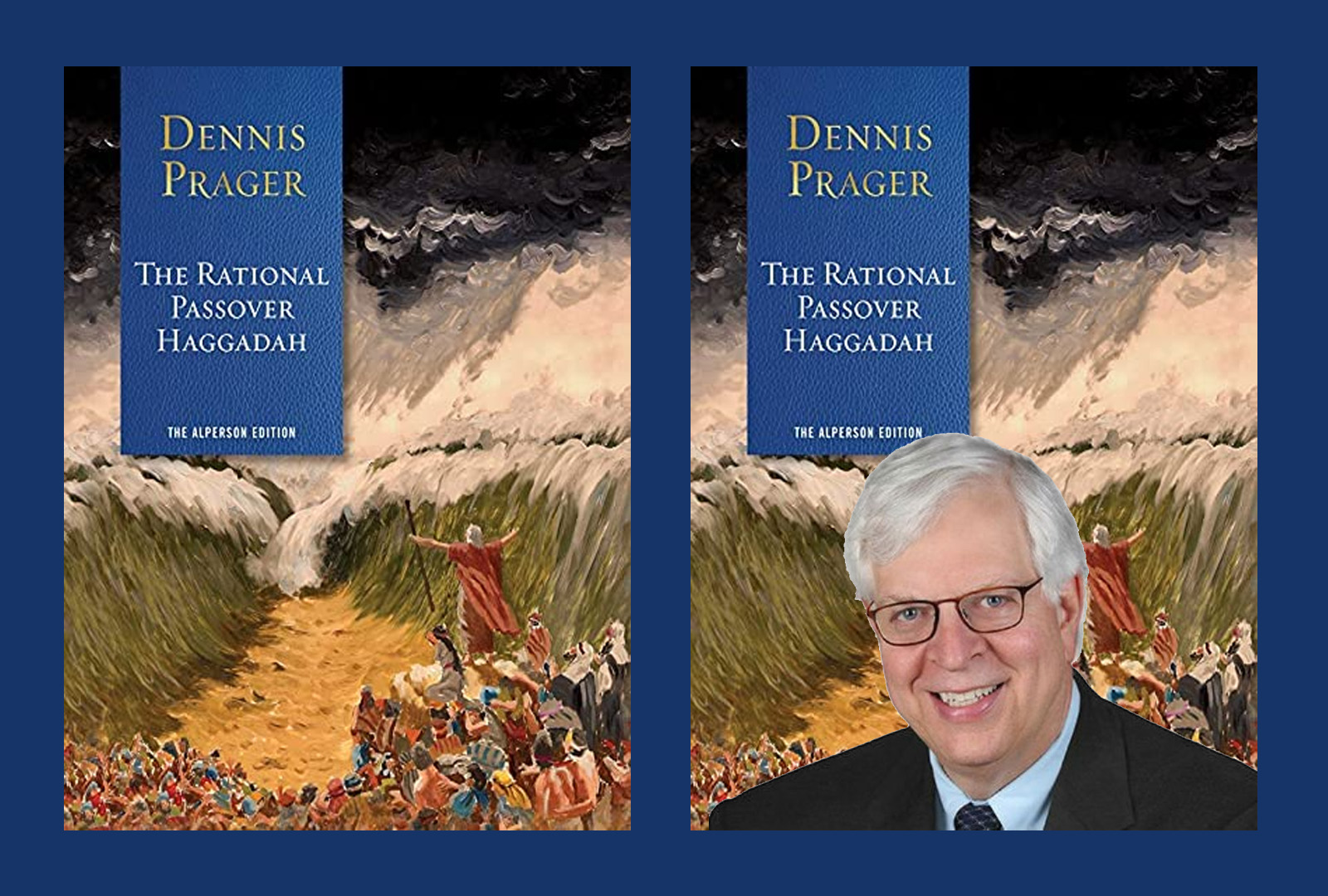Since at least the mid-90s, Dennis Prager has lent his Jewishness and yeshiva education to the Christian right. Over the decades he has taken to newspaper, radio, television, and YouTube (through the massively popular PragerU) to spread a counterfactual agenda of bigotry. Prager has tirelessly developed a pseudo-intellectual “alt-lite” image which is now a staple of fascist indoctrination, earning his organization multiple spots at the Trump Social Media Summit. Today he continues this long career with The Rational Passover Haggadah, published by the explicitly Christian conservative Salem Media Group.
It should not be surprising then that the target audience for Prager’s commentary here is not really Jewish, but philosemitic. Between the liturgical elements, the author’s interspersed commentary uses Jewish tradition as an example which American nationalists might follow, and the implied American nation Prager constructs is of course white. The “Judeo-Christian” idea called on throughout the text is both an attempt at assimilating into whiteness and islamophobic at a minimum. While I would hope the Christian audience who spend $29.99 on a copy does not use this haggadah for a seder of their own, I would additionally hope that this haggadah is not used by a Jewish seder host, given that proposed dinner conversations like “Why didn’t God save the Jews from the Holocaust?” will put many off their appetite.
Even with seven editors, including rabbis and academics, this haggadah is far from error free. Here are a few corrections any interested readers might supplement the text with:
- “One thing is certain: when Christianity died in Europe, fascism, Nazism, and communism took its place.” Every part of this is wrong. Christianity did not die in Europe. Fascism rose to power in many extremely religious countries, as was the case with Nazism. As for the communists in eastern Europe, their rise to power had to fight the church down and was never fully successful in doing so. (p.33)
- Genocide is not comparable to the destruction of a state, as states have no right to exist while human rights do exist.(p.64)
- The claim that, of all UN member states, only Israel is threatened with annihilation is untrue. North Korea and the US threaten each other in such a manner routinely, China made such a threat at Japan in July, and ongoing Russian aggression threatens to take Belarus and Ukraine off the map soon. (p.48)
- America is not the freest country in the world. The most recent indexing places it outside of the top 10. (p.19)
- Prager’s view that criminals “do not control themselves” is uncritical and arguably eugenicist. (p.121)
- The claim that the whole of America was involved in the crime of slavery and that the nation bears collective guilt for it is either victim blaming or white nationalist. Enslaved people were not practicing slavery themselves and their descendents, who suffer continued racism to this day, do not bear part of the collective guilt described. (p.52)
- While secularization is one of the main concerns Prager has throughout the haggadah, American society has not become “overwhelmingly secular”. Three quarters of Americans still identify with some religion. (p.20)
- Assimilation is not mostly dependent on religious adherence, as evidenced by many accounts of racialized antisemitism throughout the world. (p.59)
- Several reasons other than Torah values can be given for the disproportionate Jewish influence in the West, including the theological importance of Jews to certain forms of Christianity and evangelical philosemitism. (p.50)
- The claim that “moral facts are not empirically provable” is willfully ignorant of the study of empirical morality. (p.32)
- It is not “difficult for anyone who does not speak Hebrew to imagine that one word [dayenu] can mean so many words in another language”. This concept should actually be familiar to anyone who has ever studied a second language or used a thesaurus. (p.74)
While there are many other statements in The Rational Passover Haggadah worth taking issue with, making an exhaustive list would be, well, exhausting.
Despite many appeals to the idea of tradition, Prager refreshes the haggadah with some personal flair. Rather than explaining the four questions as an opportunity to encourage children to be inquisitive, he sees the questions as a tool for “teaching the next generation what the previous generation stands for and seeks to perpetuate.” (p.17) The Rational Passover Haggadah is a guidebook for turning a nice family gathering into cordial political indoctrination on three main points: “Judeo-Christian” religion comes first, freedom is second to G-d, and Western society needs structured rituals in order to avoid evanescence: supposedly “the reason Jews are the longest living continuous culture” (p.17), though a quick search will show competing claims to that title.
This book is not published by Jews, should not be used by Jews, and is rather weak in its proposed sociological understanding of Jews & the West. I won’t go so far as to call it goyish, but maybe goy-ish. If I might rely on cliché, the most Jewish thing about this haggadah is its anxiety.
This “rational” text is nervously obsessed with social decline, the death of national identity, and a potential meaninglessness of existence. It’s not alone in its worries; the whole neoconservative movement shares these obsessions as their basic problem with neoliberalism. God became pooh bear, the Friedman doctrine became America’s single mitzvah, modernism fell with the Berlin wall, and in fear of the future ahead many started calling for a return to the repressive society they imagined before all this. This haggadah’s proposed social reforms are reactionary, inspired by blue laws and the rest of 60s Americana. Prager’s refuge is nostalgia, recreating the past to make up for a lack of creativity required to forge the future.
The thing is, Dennis Prager knows his political agenda isn’t working towards a perfect society. He says as much in his haggadah, calling utopianism a “dangerous ideology” right alongside despair. This point gets no real explanation, so it can basically be summed up to an irrational utopophobia. While every political philosophy has to contend with some degree of realism, full-out utopophobia is indefensible. Horizons must be envisioned lest one discover they are working towards someone else’s end goal. Prager’s lack of vision thus helps explain why he keeps collaborating with and platforming antisemites. Further, it is almost absurd for such a staunch Zionist as Prager to take the stance he does given the multitude of utopian visions which led to the state of Israel we see today.
The Rational Passover Haggadah is irrational, inaccurate, and a bit painful to get through. For all of the time spent advocating for a visionless America reminiscent of yesteryear (yet no particular year), it strikes me as odd that Prager didn’t mention the Maxwell House Haggadah even once. Now in its 90th year, there may be no more familiar symbol of an American Jewish tradition which binds the present to the past, doing the real work of maintaining the community Prager is so worried about. The Maxwell House Haggadah, tacky as it may be to some, might be just the thing Dennis Prager should use at his own seder to calm his anxieties about the past now being behind him and to prevent his guests from experiencing the nightmare of a haggadah he put together this year.
—
The Rational Passover Haggadah by Dennis Prager is available March 1, 2022, in hardcover (180 pp, $29.99, 978-1-68451-258-4) from Regnery Faith, www.regnery.com.

